A Comprehensive Collection of Pain and Opioid Use Disorder Compounds for High-Throughput Screening and Artificial Intelligence-Driven Drug Discovery
引用次数: 0
Abstract
As part of the NIH Helping to End Addiction Long-term (HEAL) Initiative, the National Center for Advancing Translational Sciences is dedicated to the development of new pharmacological tools and investigational drugs for managing and treating pain as well as the prevention and treatment of opioid misuse and addiction. In line with these objectives, we created a comprehensive, annotated small molecule library including drugs, probes, and tool compounds that act on published pain- and addiction-relevant targets. Nearly 3000 small molecules associated with approximately 200 known and hypothesized HEAL targets have been assembled, curated, and annotated in one collection. Physical samples of the library compounds have been acquired and plated in 1536-well format, enabling a rapid and efficient high-throughput screen against a wide range of assays. The creation of the HEAL Targets and Compounds Library, coupled with an integrated computational platform for AI-driven machine learning, structural modeling, and virtual screening, provides a valuable source for strategic drug repurposing, innovative profiling, and hypothesis testing of novel targets related to pain and opioid use disorder (OUD). The library is available to investigators for screening pain and OUD-relevant phenotypes.

用于高通量筛选和人工智能驱动药物发现的疼痛和阿片类药物使用障碍化合物综合汇编
作为美国国立卫生研究院(NIH)"帮助戒除毒瘾长期计划"(HEAL)的一部分,美国国家转化科学促进中心(National Center for Advancing Translational Sciences)致力于开发新的药理学工具和研究药物,用于控制和治疗疼痛以及预防和治疗阿片类药物滥用和成瘾。根据这些目标,我们创建了一个全面的、附有注释的小分子化合物库,其中包括作用于已公布的疼痛和成瘾相关靶点的药物、探针和工具化合物。与大约 200 个已知和假设的 HEAL 靶点相关的近 3000 种小分子化合物已被收集、整理和注释在一个集合中。该化合物库的物理样本已采集完毕,并以 1536 孔的格式进行了培养,从而能够针对各种检测方法进行快速、高效的高通量筛选。HEAL 靶点和化合物库的建立,加上人工智能驱动的机器学习、结构建模和虚拟筛选的集成计算平台,为疼痛和阿片类药物使用障碍 (OUD) 相关新靶点的战略药物再利用、创新性分析和假设检验提供了宝贵的资源。研究人员可利用该库筛选与疼痛和阿片类药物使用障碍相关的表型。
本文章由计算机程序翻译,如有差异,请以英文原文为准。
求助全文
约1分钟内获得全文
求助全文

 求助内容:
求助内容: 应助结果提醒方式:
应助结果提醒方式:


